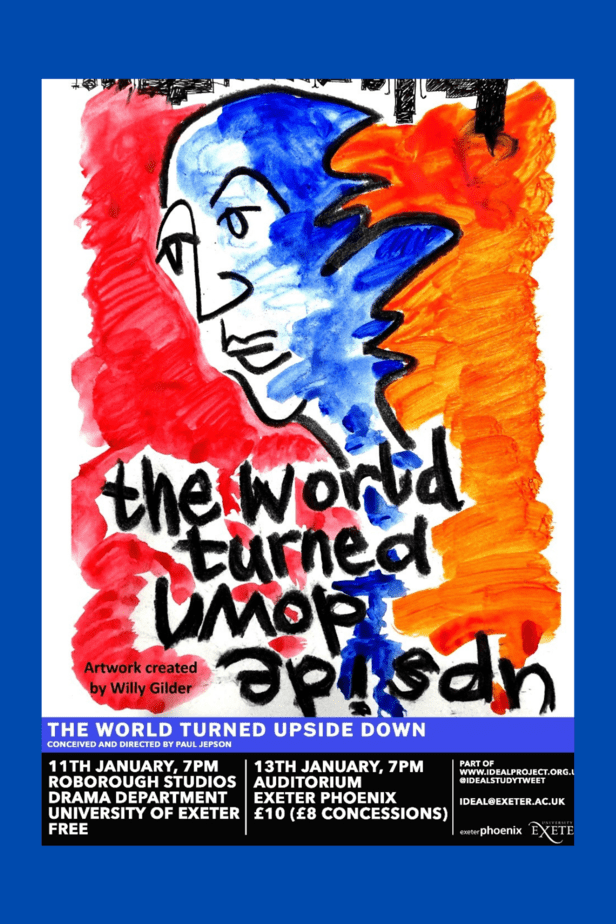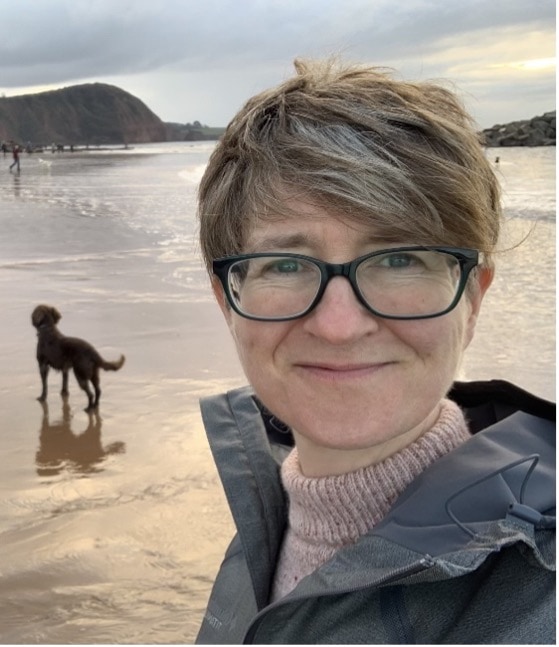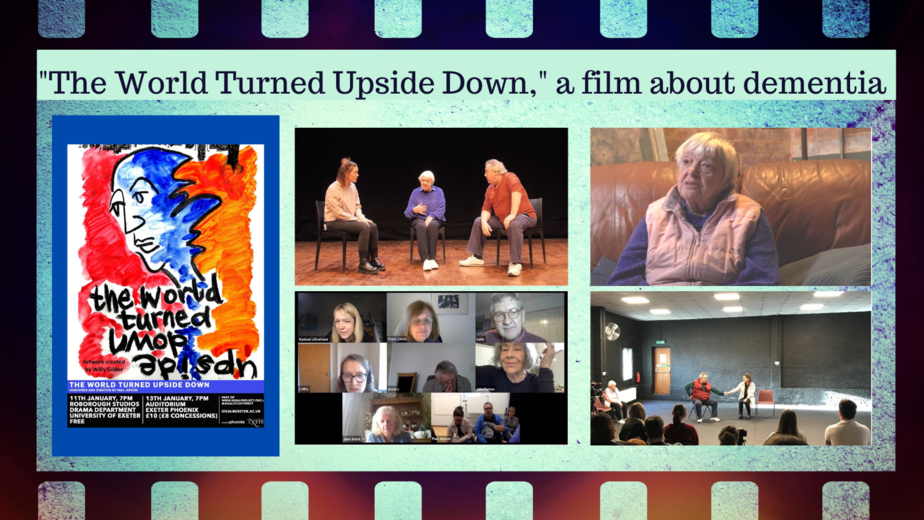By Claire Pentecost, PhD, Exeter, United Kingdom
Our film, “The World Turned Upside Down,” began as a conversation-starting play, linked to the IDEAL dementia research programme. IDEAL stands for “Improving the Experience of Dementia and Enhancing Active Life,” and is the largest study of living well with dementia in Great Britain.
The original idea came from a conversation between Linda Clare, Professor of Clinical Psychology of Ageing and Dementia at the University of Exeter, and Theatre Director Paul Jepson about the potential for using drama to explore how to improve communication and care. They thought that by using techniques involving audience input the outcome would be insightful for all involved. What we achieved is a play with a truthful representation of real issues concerning people with dementia and carers, and a film that captures this and its impact on the audience.
As part of the IDEAL programme, based at the University of Exeter in the UK, we created a play to explore the difficult situations faced by people with dementia and the people they interact with when communicating every day. IDEAL is funded as a Centre of Excellence by Alzheimer’s Society, the UK’s national dementia charity and research funder.
My partner’s father had mixed dementia: Alzheimer’s and vascular. We would take him out for a drive or a walk and sometimes to the beach. It gave us all great pleasure. Even though words were sometimes not accessible, we found ways of communicating our emotions. It’s easy to read a genuine smile! But there may be other times when saying what you want to say, or understanding the other person, is not easy. Things are either not said, or perhaps misunderstood, and this is one of the things we wanted to explore in the play.
How did we create a play about dementia where audience members steer the action?

“The World Turned Upside Down” may not look like a typical play, because it is based on forum theatre techniques. This process involves “stopping the action” and the audience interjecting with their own ideas about how the scene could change to deal with the problem presented. The first thing we did was to create some scenarios, each with a possible “tipping point,” where it could go better or worse for the characters involved. We did this by running ideas past our patient and public involvement group (called the ALWAYs group – a group of people with dementia and carers) who helped us keep our research relevant and embedded in real-life experience.
Preparing the actors
Care was taken to choose the best possible actors and to help them understand enough about dementia to give credible performances. Part of the preparation for the actors was to meet the ALWAYs group and ask questions.
We also thought about our audiences carefully. We wanted representation from young people, so performed the play for an audience of high school students. We also purposefully directed invitations to groups we thought would have interesting insights into interactions with people with dementia, such as health care professionals, people with dementia, and their carers, as well as advertising performances to the general public.
The scenarios, and putting it together
The scenarios, although based on some fairly typical experiences, were not designed to be representative; rather the objective was to stimulate ideas about how we can communicate better in that scenario. Once we put these scenarios in front of a live audience it was overwhelming to see the impact on the emotions of the audience, and to hear audience members’ own experiences and insights:
- “Every person needs to be listened to. And if one way of communicating doesn’t work then you need to find a way around this/a different way.”
- “The power ‘we’ can have on the [outcome] of what follows. Our feelings, emotions, choice of words, body language impacts the person’s responses.”
Although I had seen the scenes played during rehearsals, during performances they held my attention every time, and I found myself feeling all the emotions. By exploring the different possible ways of playing the same scenario it really helped me to understand that we do have options about how we respond. Seeing how both parties are affected by each other’s actions and reactions really brought that home. The audience picked up on this, and many reflected on the impact the play had on their own view of dementia. We also asked for insights into the impact the play had on the actors.
How to Watch
“The World Turned Upside Down” is available on YouTube, and the “screening pack” has been used with great success by care homes and local cinemas in the UK. If you want to do this, you are welcome. The film is free and yours to circulate widely. You can stream via YouTube or we can send an MP4 file. If you would like the MP4 so you can run your own screening, just email IDEAL@exeter.ac.uk.
We would love to hear what you think. You can drop us your comments by emailing IDEAL@exeter.ac.uk or comment within YouTube. You might also be interested to explore the Living with Dementia Toolkit which we co-created with people with dementia and carers and which is freely available online.
About the Author
 Dr Claire Pentecost is the programme manager on the IDEAL programme at the University of Exeter, UK, and Producer of “The World Turned Upside Down.” Claire is a qualitative researcher who analyses in-depth interviews of people with dementia and carers. IDEAL stands for Improving the Experience of Dementia and Enhancing Active Life, and is a programme of research, collecting information from people with dementia and carers since 2014 to understand what influences the potential for a good quality of life for people with dementia and carers over time, and how we can improve the experience of living with the condition.
Dr Claire Pentecost is the programme manager on the IDEAL programme at the University of Exeter, UK, and Producer of “The World Turned Upside Down.” Claire is a qualitative researcher who analyses in-depth interviews of people with dementia and carers. IDEAL stands for Improving the Experience of Dementia and Enhancing Active Life, and is a programme of research, collecting information from people with dementia and carers since 2014 to understand what influences the potential for a good quality of life for people with dementia and carers over time, and how we can improve the experience of living with the condition.

![]() .
. ![]()

Connect with Claire
Twitter @ClairePentecost
Twitter @IDEALStudyTweet


